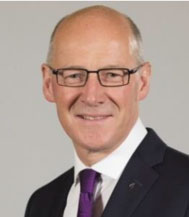Developing the young workforce: fifth annual progress report 2018-2019
Fifth annual report of developing the young workforce covers academic year 2018 to 2019 and highlights early progress made in the first part of academic year 2019-2020.
Foreword

Deputy First Minister and Cabinet Secretary for Education and Skills

Minister for Business, Fair Work and Skills
We want all of our young people to have the skills and knowledge required to reach their full potential. It is important that they have the breadth of choices and pathways to thrive in their careers and wider lives.
Our Developing the Young Workforce (DYW) programme is central to this and sits alongside Curriculum for Excellence and GIRFEC[1] as part of three interrelated programmes that underpin our ambitions for Scottish education.
DYW is a partnership between local government, schools, colleges, training providers and employers.
In this year, we are delighted that this partnership approach has been internationally recognised by the World Future Council, who awarded the DYW the Future Policy Silver Award 2019. The World Future Council are a National Government Organisation made up of 50 eminent Global change makers who look at the best policies for development and sustainability across world. The award; in partnership with UN Agencies and the Interparliamentary Union acknowledges policies that create better living conditions for current and future generations, and each year they identify one topic on which policy progress is particularly urgent.
Above all, the award recognises the success of Scotland's young people who continue to achieve at school in record numbers and who, as the work progress on pages 7 and 8 of this report progresses, are changing the way we celebrate young people's successes.
Building on our engagement with young people, parents and teachers, this year we published a refreshed narrative for Scotland's Curriculum, - providing the platform for early learning settings and schools to ensure that our children and young people gain the knowledge, skills and attributes needed for life in the 21st century. It allows for local flexibility to best meet the needs of all young people and supports us in meeting the ambitions of the Commission for Widening Access.
Responding to the needs of young people and employers, we continue to increase the breadth of opportunities available. There are now a wider range of exciting industry-led technical and professional courses and qualifications, at a range of SCQF levels, alongside existing, well-established pathways. This ensures young people have the opportunity to not only study different things, but can also participate in different ways of learning.
This includes in one of the 5,000 Foundation Apprenticeship (FA) opportunities available this academic year. We are very grateful to Skills Development Scotland, our colleges and local authorities in supporting the expansion of the FA. The case study on page 32 of this report make clear the way in which it can impact on a range of different learners.
Central to the success of the FA has been the increasing number of employers engaging with education to ensure our young people for the world of work. Our network of 21 employer-led DYW Regional Groups continues to support industry to engage with the education system. We see an ever increasing number of new and innovative approaches to school-employer partnerships in schools, which is creating a broader curriculum offer and an enhanced offer of work inspiration activity in schools.
Overall we are delighted that we continue to achieve the programme's headline target, of reducing youth unemployment by 40% by 2021 – having achieved this in May 2017. Youth unemployment continues to be at a historic low, but we know these are changing times and continue to be mindful of the wider political and economic uncertainties.
Increasing the pace of change
There is still much to do, therefore we have engaged with agencies to succession plan for 2021 and beyond – this has included a focus on work we expect to continue beyond DYW.
To strengthen our partnerships, we are continuing to invest in Scotland's regional capacity for collaboration and improvement. We have provided extra funding to the Regional Improvement Collaboratives (RICs), bodies formed with the purpose of improving education and closing the poverty-related attainment gap in the schools in their areas, to build on the support and expertise provided by individual local authorities and further strengthens the learner journey for children and young people.
To ensure we are getting it right for all young people, we have also announced an independent review of the Senior Phase. The review will explore how the curriculum is being implemented for young people in S4-S6 across the country and will identify any areas for improvement.
Looking ahead, we are well placed to deliver on the ambitions of DYW. We welcome the continued engagement and support of all those pursuing DYW at a local, regional and national level.
You will see in this report our ambition to look beyond 2021. Over the course of the year ahead we will seek your input to help us shape the future of DYW and with it Scottish education.
John Swinney
Deputy First Minister and Cabinet Secretary for Education and Skills
Jamie Hepburn
Minister for Business, Fair Work and Skills
December 2019
Foreword from Councillor Stephen McCabe, COSLA Education, Children and Young People Spokesperson

I am very pleased to present this fifth annual report of the Developing the Young Workforce (DYW) Programme. Through DYW local government demonstrates our commitment to providing young people with improved opportunities to learn the skills and gain the experience required to move on to the next stages in their lives and thrive. As COSLA's Spokesperson for Children and Young People, I'm very pleased that the whole of our education system, Local Government, Scottish Government, Colleges and other key partners are pulling together to implement DYW. This is a real testament to the partnership working and the efforts of all involved to put young people and their futures at the heart of everything we do.
I have been greatly enthused by the progress that we have made in implementing DYW. Across Scotland there has been a step-change in how we approach vocational education, work-based learning and greater collaboration between schools, colleges and employers. Crucially equipping young people with new skills and abilities, supports not just them but also our local economies and ensures that the Scottish economy is fit for the future.
These efforts have resulted in us continuing to meet the target for the DYW Programme of reducing youth unemployment by 40%, well ahead of our original 2021 deadline. The programme has led to more school leavers attaining vocational qualifications at Higher level, over 3,000 starts to the new Foundation Apprenticeship and record numbers of young people in positive destinations. I was particularly pleased to see that Developing the Young Workforce has received international recognition, winning the Future Policy Silver Award 2019 from the World Future Council in recognition of the effort being made to support current and future generations.
Whilst we continue to meet our high-level targets, we also need to keep in mind the challenging goals we have set for ourselves, and where we still need to go further to fully delivering DYW by 2021. For the remainder of DYW there is a need to prioritise activities that will make progress in addressing equalities issues, particularly for disable young people, care-experienced young people and young people from minority ethnic communities - we must to more to make sure that we support those who have had the least from DYW to date.
I look forward to continuing this fantastic partnership over the next few years, working together ensure that we provide all our young people with the skills and abilities for they need for their future.
Contact
Email: paul.fagan@gov.scot
There is a problem
Thanks for your feedback